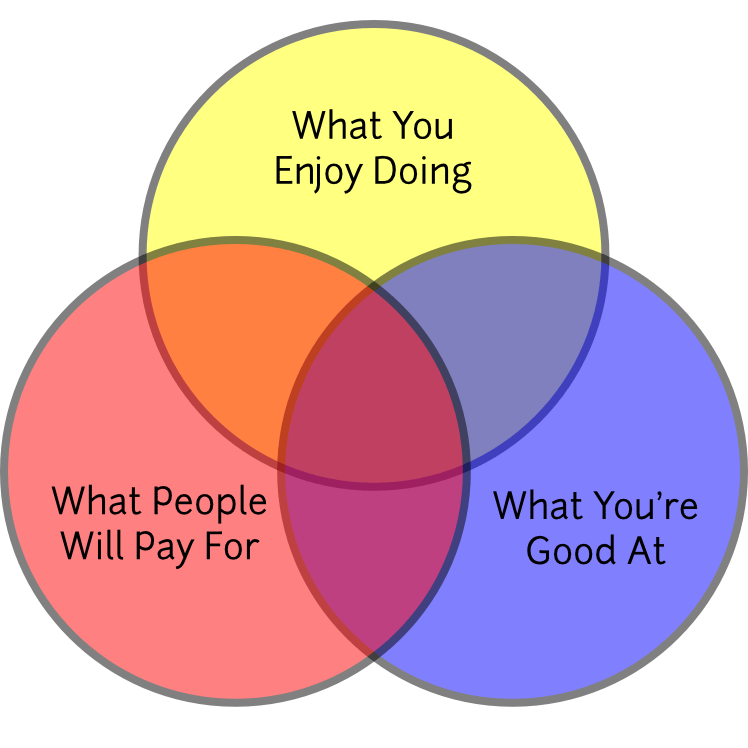What Should I Do For Work? How to Decide Your Freelance Services
Who wouldn't want to be a freelancer? You're your own boss. You get to work from home and set your own hours. You can expect a higher paycheck than people on a long-term contract working in a similar position.
Dreaming of freelancing is one thing. Setting up a freelance business is another altogether.
To launch a freelance business, you need a service you can sell. This could be a skill-based service, such as writing, web design, or programming. Or you could be an expertise-based freelancer. If you plan to sell your expertise, you'll work as a consultant, a coach, an author, or a speaker.
How do you decide which services you can offer?
The answer lies in this Venn Diagram…

In this article, I'll guide you through a process for finding out what you can put in each circle (set) of the Venn Diagram. Then you can look for the overlap between the sets. The overlap is your key to deciding your freelance services.
What Do You Enjoy?
Let's start with the easiest section. What do you enjoy doing?
You're not looking for your life's passion here. You're just getting clear on the things you find enjoyable, at home and in the workplace.
The following questions can help you discover what you enjoy:
- When do you feel happiest during your work day? What are you doing at the time?
- What do you for fun in your free time?
- Which projects have you over-delivered on at work, just because you felt like it?
- How do you express your creativity at work? What about when you're at home?
- Which aspects of your job would you still continue, even if you weren't paid for them?
- Do you prefer working alone or as part of a team?
Another tip for discovering what you most enjoy is keeping a gratitude journal. At the end of each day, before you go to bed, spend a few minutes reflecting on the time since you woke up. Play back the day in your mind, like a movie. At which moments did you feel most alive? What are you most grateful for from the day? It's a simple exercise, but you'll probably be surprised by what you discover.
When you're going through the things you enjoy, don't ask yourself, "Could I really be paid for this?" Just write it down. You'll answer that question later. Wondering about money at this stage could cause you to reign in your creativity unnecessarily.
What Are Your Skills?
The next stage is to consider what you're good at. These are your skills. Again, look at what you're good at both at home and in the workplace.
Consider…
- The skills people compliment you on
- What people come to you for help with
- The classes you found easiest at school
- The papers that got you the highest grades in college
- The work tasks you find easy that others struggle with
- Skills you've picked up without much effort
It can be insightful to ask for help from your friends, family, and work colleagues when you're working through this step. We're often blind to our own skills. This may be out of modesty, or it may be because we're more aware of where we fall short than where we excel. Asking others, you'll discover things you never considered on your own.
For extra insight, you can take an online personality test to help you discover your natural gifts and abilities. The Myers-Briggs test is one of the most helpful…
What Are People Willing to Pay For?
Not everything you're good at has a market. Some skills will always be a hobby. Many skills, however, even those you've picked up from your hobbies, are marketable. For example, if you enjoy gardening, there are plenty of people who are willing to pay for garden help. If you play a musical instrument, you could become a music tutor.
The quickest way to get an overview of what people are willing to pay for is to look online. Start by looking at freelance job sites such as Elance. Check out the different categories of skills they offer. The work available on Elance usually involves working at your computer.
What if you have skills that don't fit with what's available on Elance? Look in local newspapers and magazines, as well as your local Craigslist website. See the businesses that are promoting their services. If they're advertising for work, then there's a market for that skill.
Bringing It All Together
Your final task is to look at the overlap between what you enjoy, what you're good at, and what people are willing to pay for. This overlap shows you the freelance services you can offer.
If nothing is immediately apparent, don't be disheartened. First, look for connections that aren't apparent at first glance. Maybe you enjoy art, and you're good at drawing. You've discovered not many people are willing to pay for your art skills. But looking more closely, you see there are many businesses willing to pay handsomely for help with design. You could use your art skills to set up as a graphic designer.
Second, take heart that you don't need 10,000 hours to learn a new skill, as common lore suggests. According to Josh Kaufman, author of The Personal MBA, you can learn almost anything in 20 hours.
Now that you've found your freelance service offering, you're ready to conduct a more in-depth analysis of the marketplace for your services. Doing this, you'll discover the best way to position yourself for success. We'll look at how to do that in our next article.
comments powered by Disqus



